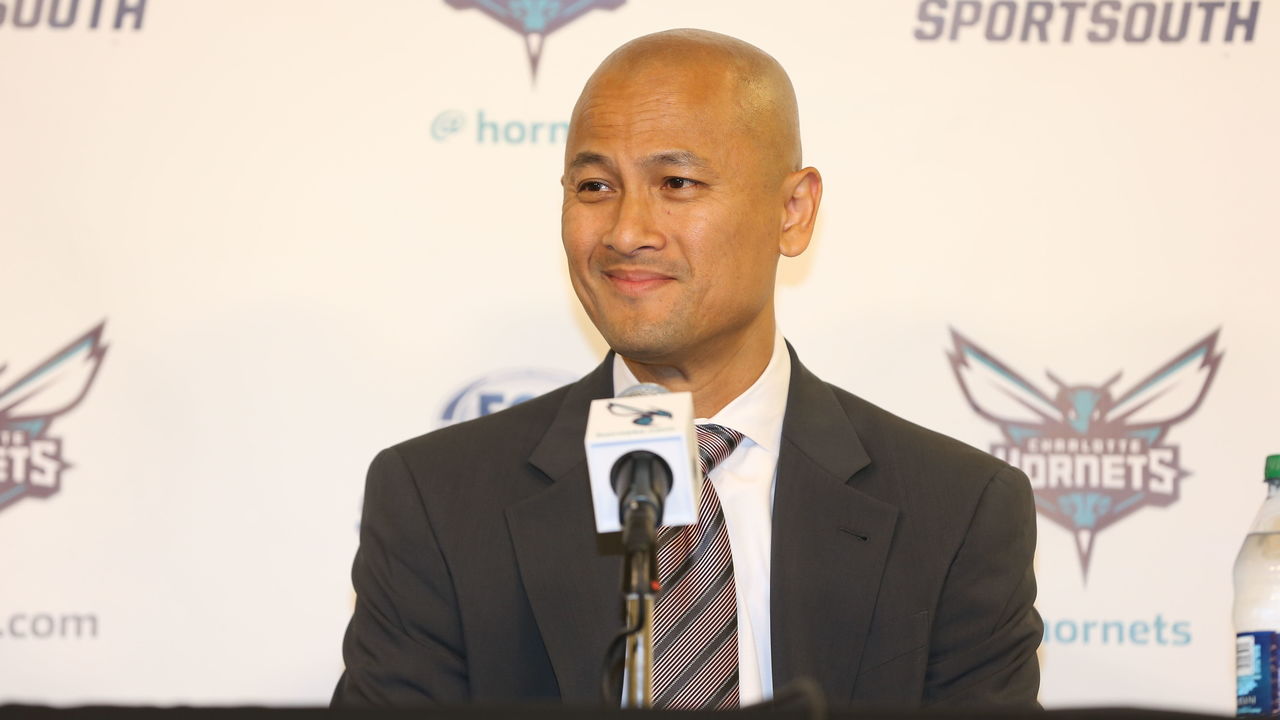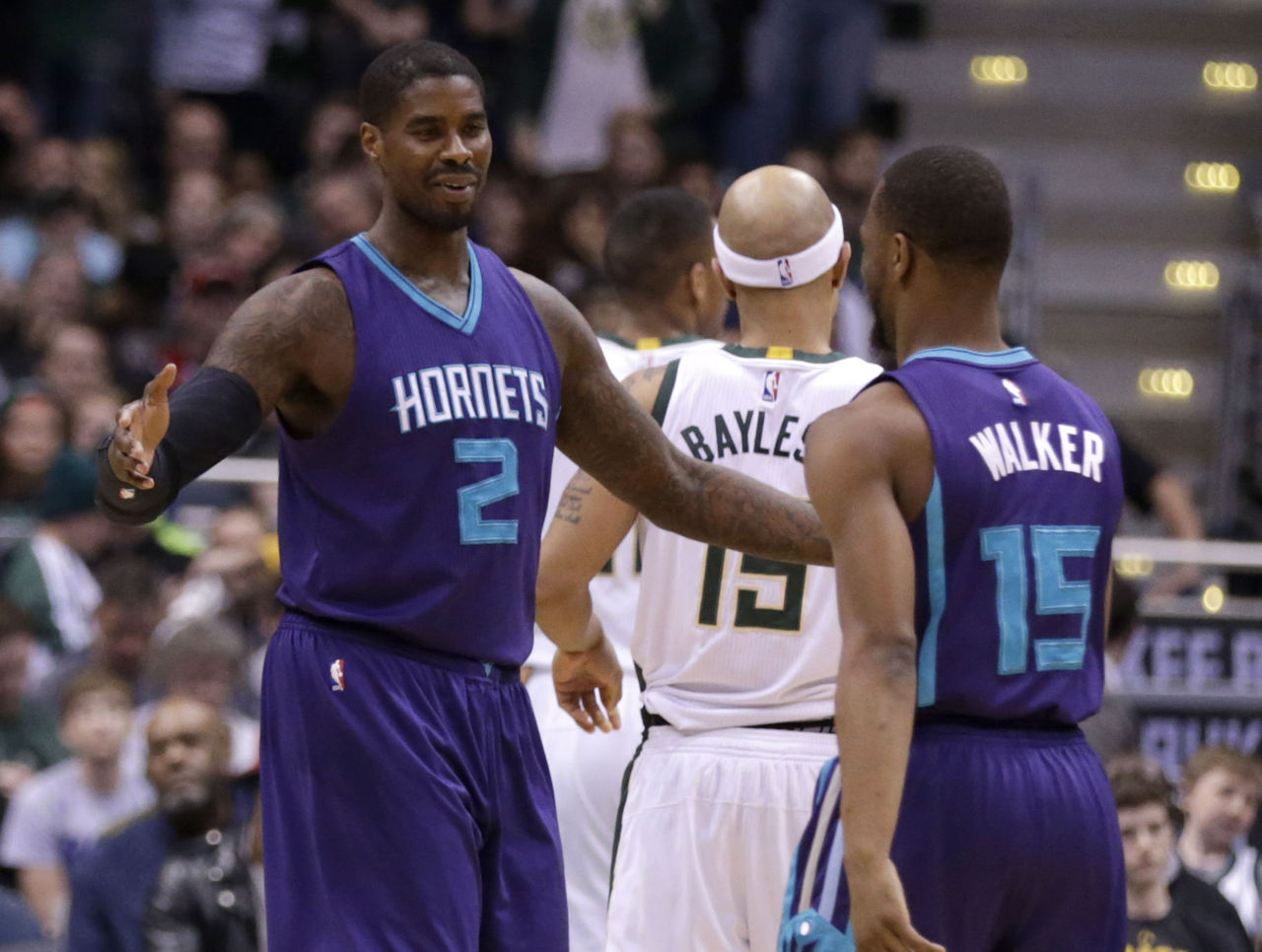Buzz off: Why the poorly constructed Hornets should consider trading Kemba
The Charlotte Hornets beat the Warriors 111-100 on Friday, handily disposing of the reigning champs on their own turf. The Dubs' late scoring barrage - their usual antidote to any 15-point deficit - never came, as a throwback game from Dwight Howard and a stable of long-limbed perimeter defenders were able to hold the Warriors in check.
But the elation in Charlotte will be short-lived, as the Hornets come to realize that nothing has changed. They're still on track to miss the playoffs by a wide margin while paying the NBA's ninth-highest salary to players just good enough to push them beyond choice draft position next summer.
The on-court product remains uninspiring. General manager Rich Cho filled in the gaps around Howard and All-Star Kemba Walker with players who can either defend, but struggle with shooting range past the length of their arms, or can shoot, but can't play a lick of defense. The lack of versatility lends itself to a predictable offense; it's easy for opponents to cut off the Hornets' attack when either Walker or Howard attempt to overpower or outwit the defense in the paint.
Walker has made leaps as a distributor and perimeter shooter year-over-year, but that still hasn't been enough to push the Hornets to the playoffs, let alone legitimate title contention. Nicolas Batum, in year two of a five-year, $120-million contract, was injured to start the year, but the fact remains that he's regressed as a perimeter threat, shooting a career-low 29.5 percent on 3-pointers through 21 appearances. Howard's been good, but not good enough most nights.
The sum of the Hornets' parts is a team with a 13-22 record, five games removed from the Eastern Conference's eighth seed, but just four games ahead of the league-worst Atlanta Hawks, who sit in pole position for top lottery odds for the loaded 2018 draft. Short of Malik Monk rapidly developing into an above-average rotation player, Michael Kidd-Gilchrist becoming a knock-down shooter, or Frank Kaminsky turning into a strong perimeter defender, it's difficult to see where this team finds significant internal growth before Walker hits unrestricted free agency in summer 2019.
It's time for the Hornets to embrace the possibility of a full-on rebuild to overhaul the front office, coaching staff, and roster. Step 1 is making a franchise-altering decision about their best player - while Walker's trade value is at its highest.

(Photo courtesy: Action Images)
But why trade their best player? Well, the Hornets' salary cap situation is a mess.
Cho's regime has hamstrung the Hornets' books, making it nearly impossible to bolster the roster around Walker with win-now pieces. Here's how the Hornets' veteran salaries look over the next four seasons:
| Player | 2017-18 | 2018-19 | 2019-20 | 2020-21 | 2021-22 |
|---|---|---|---|---|---|
| D. Howard | $23.5M | $23.8M | UFA | ||
| N. Batum | $22.4M | $24M | $25.6M | $27.1M* | UFA |
| M. Williams | $13.2M | $14.1M | $15M* | UFA | |
| M. Kidd-Gilchrist | $13M | $13M | $13M* | UFA | |
| C. Zeller | $12.6M | $13.5M | $14.5M | $15.4M | UFA |
| K. Walker | $12M | $12M | UFA |
*Player option
(Figures courtesy: Spotrac)
The Hornets have already committed $73.7 million to six players for 2019-20: Batum, Marvin Williams, Kidd-Gilchrist, Cody Zeller, Monk, and Dwayne Bacon. That figure doesn't account for:
- Extensions for restricted free agents Kaminsky or Treveon Graham.
- Any additional rookie-scale players added over the next two summers.
- The five-year, $150-million max contract Walker should command after next season.
Either Michael Jordan has to commit to paying over $100 million per year for a team with a limited shot at upward mobility, or he needs to give his front office the mandate to start stripping the roster down.

(Photo courtesy: Getty Images)
Given the Hornets' collection of assets, there are two ways to move an onerous, cap-crunching contract. The first is to package the bad money with a draft pick - say, Williams, Johnny O'Bryant III, and a protected first-round pick for the Suns' Greg Monroe (and his expiring $17.1-million contract). The Hornets are already badly in need of controllable, cheap assets and aren't flush with draft picks - they have their own first-rounders, no more and no less - so that option doesn't really advance their goals in any meaningful way.
The second option is a doozy. The Hornets could dump a win-now veteran contract by packaging it with Walker's below-market $12-million for 2017-18 and 2018-19. It would be a nauseating pill to swallow for a small-market team desperate for buzz, but if the Hornets can't win with Walker surrounded by this supporting cast, then proactively moving Walker is the best course of action. The longer Walker's next team has to convince him to re-sign, the better the assets the Hornets can net.
Returning to the Suns in this hypothetical trade destination (the Suns and GM Ryan McDonough are also in straits dire enough to consider a blockbuster move, and have a war chest stocked with picks and rookie-scale players), the Hornets could package Walker and Williams for Monroe, rookie Josh Jackson, and one of the five first-round picks they have over the next two drafts. The Hornets would get both salary relief and a pair of controllable assets, even if Jackson's blue-chip gleam has faded somewhat since the draft, and the Suns would have an opportunity to lock up a backcourt of Devin Booker and Walker for the next six-plus seasons. The Suns reportedly didn't blink when the Cavaliers asked for Jackson, Eric Bledsoe, and a pick for Kyrie Irving this summer; given how things unfolded in the aftermath of that non-trade, would the Suns make the same choice again?
If Jordan can't bring himself to change the front-office leadership, he needs to at least change its mandate; as far as the not-too-distant end of the Walker era is concerned, it's better to rip the Band-Aid off and let the scabs heal than to keep suffering through these festering, self-inflicted roster wounds.